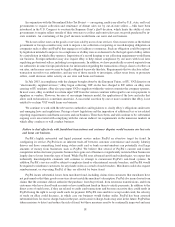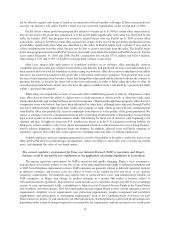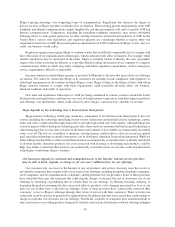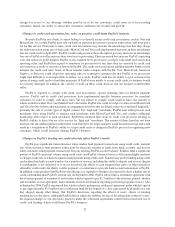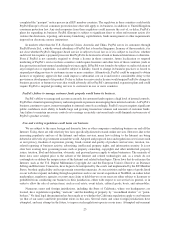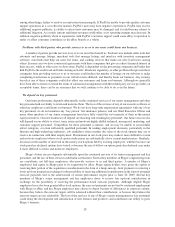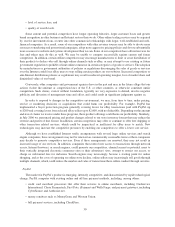eBay 2006 Annual Report Download - page 28
Download and view the complete annual report
Please find page 28 of the 2006 eBay annual report below. You can navigate through the pages in the report by either clicking on the pages listed below, or by using the keyword search tool below to find specific information within the annual report.of these laws against some of our users appears to be increasing and such attempted enforcements could harm our
business. In 2002, Illinois amended its auction law to provide for a special regulatory regime for “Internet auction
listing services,” and we have registered as an Internet auction listing service in Illinois. Although this registration
has not had a negative impact on our business to date, other regulatory and licensure claims could result in costly
litigation or could require us to change the way we or our users do business in ways that increase costs or reduce
revenues or force us to prohibit listings of certain items for some locations. We could also be subject to fines or other
penalties, and any of these outcomes could harm our business.
In addition, because our services are accessible worldwide, and we facilitate sales of goods to users worldwide,
foreign jurisdictions may claim that we are required to comply with their laws. For example, the Australian high
court has ruled that a U.S. website in certain circumstances must comply with Australian laws regarding libel. A
number of the lawsuits against us relating to trademark issues seek to have our websites subject to unfavorable local
laws. As we expand and localize our international activities, we become obligated to comply with the laws of the
countries in which we operate. Laws regulating Internet companies outside of the U.S. may be less favorable than
those in the U.S., giving greater rights to consumers, content owners, and users. Compliance may be more costly or
may require us to change our business practices or restrict our service offerings relative to those in the U.S. In
addition, we may be subject to overlapping legal or regulatory regimes that impose conflicting requirements on us.
Our failure to comply with foreign laws could subject us to penalties ranging from criminal prosecution to bans on
our services.
Our tickets business is subject to regulatory, competitive, and other risks that could harm this business.
Our tickets business, which includes our recently-acquired StubHub business, is subject to numerous risks.
Many jurisdictions have laws and regulations covering the resale of event tickets, and some jurisdictions prohibit
the resale of event tickets at prices above the face value of the tickets. In addition, new laws and regulations may be
passed that would limit our or our users’ ability to continue this business. Regulatory agencies or courts may claim
or hold that we are responsible for ensuring that our users comply with these laws and regulations or that we or our
users are either subject to licensure or prohibited from reselling event tickets in their jurisdictions.
Some event organizers and professional sports teams have expressed concern about the resale of their event
tickets on our sites, and in November 2006 the New England Patriots filed suit against StubHub alleging that
StubHub’s resale activities violate Massachusetts’ ticket resale laws and constitute intentional interference with the
team’s relationship with its season ticket holders. Such litigation could result in damage awards, could require us to
change our business practices in harmful ways, or could otherwise negatively affect our tickets business. Our tickets
business is also subject to seasonal fluctuations and the general economic and business conditions that impact the
sporting events and live entertainment industries. Our tickets business also faces significant competition from a
number of sources, including ticketing service companies (such as TicketMaster and Tickets.com), event organizers
(such as professional sports teams and leagues), ticket brokers, and other online and offline ticket resellers (such as
TicketsNow and RazorGator). If we are unable to effectively compete with these competitors, our tickets business
could be harmed.
Our business is subject to online security risks, including security breaches and identity theft.
To succeed, online commerce and communications must provide a secure transmission of confidential
information over public networks. Our security measures may not detect or prevent security breaches that could
harm our business. Currently, a significant number of our users authorize us to bill their credit card accounts directly
for all transaction fees charged by us. PayPal’s users routinely provide credit card and other financial information.
We rely on encryption and authentication technology licensed from third parties to provide the security and
authentication to effect secure transmission of confidential information, including customer credit card numbers.
Advances in computer capabilities, new discoveries in the field of cryptography or other developments may result in
a compromise or breach of the technology used by us to protect transaction data. In addition, any party who is able to
illicitly obtain a user’s password could access the user’s transaction data. An increasing number of websites have
reported breaches of their security. Any compromise of our security could harm our reputation and, therefore, our
business. In addition, a party that is able to circumvent our security measures could misappropriate proprietary
information, cause interruption in our operations, damage our computers or those of our users, or otherwise damage
24






